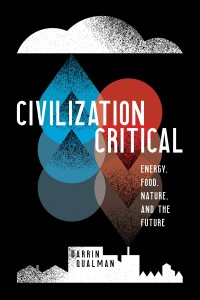Book Pleasures review of Civilization Critical

Civilization Critical
Energy, Food, Nature, and the Future
Civilization Critical is an eye-opener!
I remember a Social Studies teacher in high school 63 years ago ranting about population explosion. He said the food supply couldn’t keep pace. There would be mass starvation in the world, and it had already started in Bangladesh. Despite modest attempts at birth control, it kept right on exploding and I often wondered why the starvation threat never materialized. This book explains why.
Darrin Qualman describes how injection of fossil fuel powered energy has transformed Nature’s closed loop animal and plant life cycle into a linear supercharged food production system. While it’s easy to grasp the impact of modern machinery and irrigation, one tends to underestimate the impact of over 200 million tons of fertilizer used each year and rising. Most of it is derived from petroleum. We are feeding the ever-growing population through depletion of fossil fuel resources. This of course is on top of what is burn for transportation, heating, energy production, etc.
The book goes far beyond what a review should even attempt to summarize by showing how the energy captured and used in all these ways relates to the level of civilization enjoyed and population supported. Reading Civilization Critical will broaden your knowledge of many factors impacting our societies and lifestyles, how we got to this point and where we are going in future. For me, the most “Critical” aspect Qualman reveals is the point that today’s corporate and government leaders strive toward a goal of “sustainable growth” which he shows is not sustainable at all. Must we continue to pursue “sustainable growth” until doomed by depletion of fossil fuel resources or can we move away from that to a truly sustainable civilization? Qualman provides a wonderful background understanding leading to this culminating question.
Noting that the author grew up farming in Saskatchewan, I found myself guilty of stereotyping by expecting a “down on the farm” approach. Quite the opposite, Qualman displays his academic credentials throughout. At times he has a penchant for big words and occasionally seems to belabor a key point. However, the book is thoroughly readable, and its contents easily grasped.
Too bad my old Social Studies teacher didn’t have it under his belt. He could have ranted about what really happened and what we must do moving forward if our human golden age is to survive.
— Book Pleasures, September 2019

